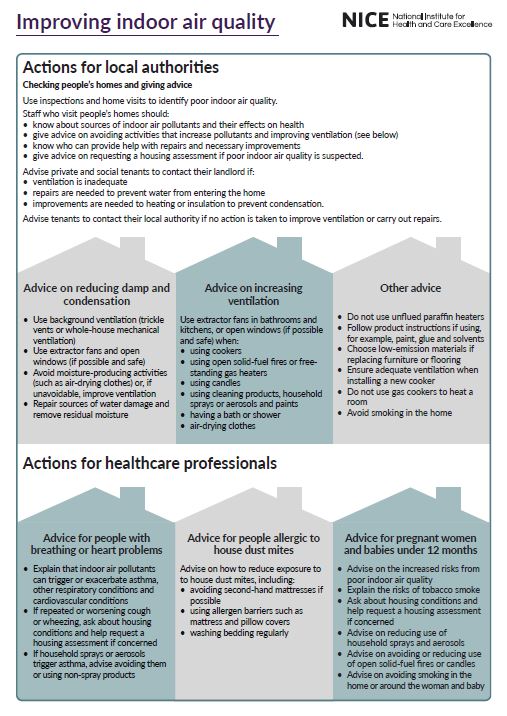Overview
This guideline covers indoor air quality in residential buildings. It aims to raise awareness of the importance of good air quality in people's homes and how to achieve this.
NICE has also produced a guideline on outdoor air pollution.
Recommendations
This guideline includes recommendations on:
- prioritising indoor air quality in local strategy or plans
- housing assessment referrals
- raising awareness of poor indoor air quality in the home and advice for the general public
- advice for people with pre-existing health conditions and pregnant women
- using standards to improve indoor air quality
- ensuring architects and designers take account of indoor air quality
- ensuring builders, contractors and developers comply with building standards
- ensuring rental properties comply with regulations
Who is it for?
- Environmental health practitioners
- Building control, housing and maintenance staff
- Healthcare professionals
- Public health professionals
- Planners and regulators involved with residential developments
- Architects, designers and builders
- Private property managers and private landlords
- Housing associations
- Voluntary sector
- Members of the public
Guideline development process
How we develop NICE guidelines
NICE worked with Public Health England to develop this guidance.
Your responsibility
The recommendations in this guideline represent the view of NICE, arrived at after careful consideration of the evidence available. When exercising their judgement, professionals and practitioners are expected to take this guideline fully into account, alongside the individual needs, preferences and values of their patients or the people using their service. It is not mandatory to apply the recommendations, and the guideline does not override the responsibility to make decisions appropriate to the circumstances of the individual, in consultation with them and their families and carers or guardian.
All problems (adverse events) related to a medicine or medical device used for treatment or in a procedure should be reported to the Medicines and Healthcare products Regulatory Agency using the Yellow Card Scheme.
Local commissioners and providers of healthcare have a responsibility to enable the guideline to be applied when individual professionals and people using services wish to use it. They should do so in the context of local and national priorities for funding and developing services, and in light of their duties to have due regard to the need to eliminate unlawful discrimination, to advance equality of opportunity and to reduce health inequalities. Nothing in this guideline should be interpreted in a way that would be inconsistent with complying with those duties.
Commissioners and providers have a responsibility to promote an environmentally sustainable health and care system and should assess and reduce the environmental impact of implementing NICE recommendations wherever possible.
